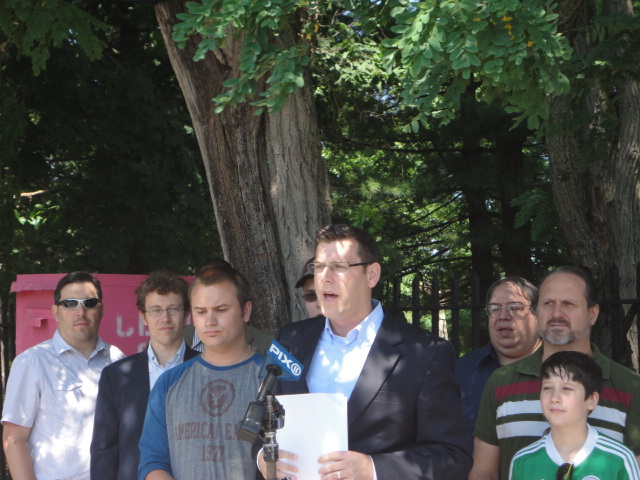Assemblyman Braunstein Announces Legislation Banning Fake Charity Clothing Bins
Assemblyman Edward C. Braunstein (D-Bayside) announced that he will be introducing legislation that would ban clothing bins that are not operated by 501(c)(3) organizations recognized by the Internal Revenue Service. This legislation would also allow for the immediate removal of clothing bins that are on public property, and would impose monetary penalties on the owners of such bins.
“These for-profit entities are benefitting from the generous nature of our community by misleading people into believing that their donations are going to help those in need of assistance,” said Assemblyman Braunstein. “They also frequently place these bins on sidewalks and other public places damaging the quality of life of our neighborhoods. Enough is enough! It is time we remove these bins from our streets and ensure that these fake charities no longer benefit from their deceptive actions.”
Current New York City law bans all clothing bins on public property, and gives operators of clothing bins that are illegally placed 30 days to remove them. However, in many cases, the operators simply move the bin slightly further down the street, thus restarting the 30-day time period. This legislation would allow municipalities to remove the bins immediately after receiving a complaint. This legislation would also only allow clothing bins that are operated by 501(c)(3) organizations to be placed on private property provided they have the written consent of the owner. Additionally, both non-profit and for-profit organizations that have placed a clothing bin on public property, or on private property without the property owner’s consent, will be subject to a $250 fine for the first offense, and $500 for each additional offense within the same calendar year.
“The clothing bins have become very problematic in the area,” said Christine Haider, Chair of Community Board 11. “The Board receives many complaints about them. I support Assemblyman Edward Braunstein's legislation to remove them immediately from NYC property and fine the owners. I do feel that this will help alleviate this eyesore in our community.”
“Illegal clothing bins have emerged as an issue of major concern for many BIDs, especially in Brooklyn and Queens, as they work to improve their neighborhoods and public spaces, and the NYC BID Association has raised concerns about this issue in many quarters,” said Tim Tompkins and Michael Lambert, Co-Chairs of the NYC BID Association. “Notably, the BID Association’s Clothing Bin Working Group has been actively pursuing solutions to this ongoing problem. We are grateful to Assemblyman Braunstein for drawing additional attention to this issue and to the need for a solution.”
“I applaud Assemblyman Braunstein for taking action against these unscrupulous individuals who are looking to make a quick profit off of our intended good will donations. These illegal boxes do not serve those in need. They do nothing more than block sidewalks, attracting litter, graffiti and dumping, diminishing the quality of life in our community,” said Chrissy Voskerichian, President of the 109th Precinct Community Council.
“The proliferation of clothing drop off containers in our local neighborhoods is disturbing,” said Henry Euler, First Vice President of the Auburndale Improvement Association. “They seem to be popping up all over, many in out of the way places. We have heard that these containers are not from any well-known charitable organization. We wonder what is actually being collected and to where the collected material is being sent and/or sold to and for whose benefit? We support Assemblyman Edward Braunstein’s legislation and his other efforts to correct this situation. The beauty and stability of our communities must not be put at risk.”
“When clothing is deposited in a sidewalk bin, donors are entitled to know that they are giving to a legitimate charity,” said Warren Schreiber, President of the Bay Terrace Community Alliance, Inc., President of Bay Terrace Cooperative Section I, Inc., and Co-President of the Presidents Co-op & Condo Council. “The clothing should go to those in need. Clothing bins placed on sidewalks by fake charities create a sanitation problem and hurt those who will best be able to use the clothing. It's time for sidewalk clothing bins to be regulated.”
“Clothing bins have to be regulated because if left unregulated they become a quality of life issue. We have received complaints from businesses throughout Bayside, and this issue has to be addressed,” said Judith Limpert, President of the Bayside Business Association.
“The community of Bayside Hills, as well as the Bayside Hills Civic Association, work very hard to maintain our neighborhood in as aesthetically a beautiful condition as possible,” said Michael Feiner, President of the Bayside Hills Civic Association. “In doing so, we have become strong opponents of the numerous clothing bins that have been appearing in our streets. We thank Assemblyman Edward Braunstein for introducing this legislation banning clothing bins, and for the good of our residents in Bayside Hills and surrounding areas, wish him success in this endeavor.”
“Counterfeit charity clothing bins prey on the goodwill and compassionate intentions of our most kindhearted citizens,” said Paul DiBenedetto, President of the Bayside Historical Society. “They are an imposing eyesore and yet another form of pollution littering our neighborhoods. I am appalled at the recent outbreak of clothing collection scams in our community and call upon our elected officials to create legislation making such activities illegal and appropriately punished. As such, I support Assemblyman Braunstein’s proposed legislation to ban companies that are not registered 501(c)(3) non-profit organizations from being allowed to place clothing bins.”
“The Greater Whitestone Taxpayers Civic Association fully supports the efforts and bill being submitted by Assemblyman Braunstein,” said Kim Cody, President of the Greater Whitestone Taxpayers Civic Association. “These bins that are being placed on public and private property are not being done so by charitable organizations, but are being dropped off by private individuals who are making a profit. These clothing bins are dropped off and only have to be moved within thirty days. On the 29th day the clothing bins are moved to a different location, sometimes only down the street. By moving them the cycle starts all over again. Assemblyman Braunstein's bill would change all this and this is a change that we really need right now.”
“Many of us try to do the right thing and help those less fortunate,” said Michael P. Castellano, President of the Lost Community Civic Association. “When they place a clothing donation into a clothing bin they assume that they are helping those in need and not giving to some business that will turn these well intentioned donations into a profit for that group that is NOT a registered 501(c)(3) non-profit organization. I fully support Assemblyman Braunstein and his efforts to have these unregistered bins removed and have fines levied against those found to be in violation.”
“The clothing drop boxes that are appearing on our streets are an evil scam that insults the generosity of our neighbors. Assemblyman Braunstein's proposed legislation will punish the scammers and ensure that donations of used clothing will go to legitimate non-profit charities,” said Peter J. Brancazio, President North East Flushing Civic Association.
“I believe the clothing collection bins should be regulated and have certain guidelines that they must follow,” said Devon O’Connor, President of the Welcome to Whitestone Civic Association, Inc. “They should only be put in designated locations with written consent from the property owners. They should state exactly what is being done with the clothing and where it is going. When it comes to the Sanitation Department giving 30 days noticed before they can remove an illegally placed box, I think that it is wrong. If a car is parked illegally, it is towed right away. The bins should be taken away immediately if they are placed on a property without permission.”

